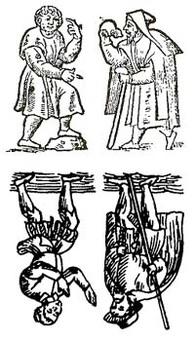Organisatoren der Tagung:
- Jens Elze (Friedrich-Schlegel-Graduiertenschule)
- Sarah Wollin (Friedrich-Schlegel-Graduiertenschule)
mit Unterstützung der Friedrich-Schlegel-Graduiertenschule für literaturwissenschaftliche Studien
Despite their great spectrum of variety, it seems that the journeys which the narrator-protagonists of (fictional) autobiographies (re-)embark upon share a common telos: that of formulating the grand narrative of their life and consequently formulating their self, either by finding God (confessio) or their own true identity (Bildungsroman). Evidently, picaresque autobiographies form a very conscious exception to this rule. Although their relators insistently assert to demonstrate their reformed self through their stories, the narratives are inherently ambivalent and, indeed, parodistic of the above autobiographical traditions.
Be it in play or in earnest, autobiographical texts always seem to implicate an important hermeneutic facet, both diegetically and extradiegetically. With regards to this hermeneutic effort, the enigma – as a rhetorical trope and textual dynamic – may be a productive mode through which both the picaresque narratives themselves, their intertextual dialogues with other genres, and the concept “enigma” itself may be newly examined. For within picaresque texts, the enigma cannot simply be read as an example of allegoria obscurior requiring an educated reader to reconstruct its meaning, as described in classical and renaissance rhetoric; nor can it be understood as cryptical writing requiring (necessarily deficient) hermeneutic explanation, as in Christian exegesis. Rather, picaresque narratives draw on these conceptual traditions of the enigma and expand, transform and delimit them to become textual dynamics or processes which may be termed “the enigmatic”. Indeed, picaresque narratives parodistically exponentiate the difficulties of their reading to the point of the enigmatic becoming a ludic end in itself, rather than a means to attaining insight into the picaro’s true self beyond the pseudo-confessional or aetiological surface.
With view to the main areas of convergence of the conceptual history of the enigma and of research on the picaresque, this workshop will have three thematic focal points: First, picaresque narratives, which may be examined with view to the terminological intersection of ainigma and griphos (which also connotes riddle but also describes a kind of fishing net). Accordingly, “an enigma is [textually] woven,” and the picaro is the one who “intertwines and twists discourses and artifices is a past master of the art of bending and interweaving things” (Sarah Kofman). Second, picaresque subjectivity, which may be examined with view to the conceptual relation between enigmas and mirrors, as described in Christian exegesis: “nunc videmus per speculum in aegnimate” (St. Paul) – a declaration which may, subversively, describe the image the picaro constructs of himself through the self-reflection he performs in his retrospective narration. Third, the picaresque genre, which has been the subject of two recent conferences (The Paradigm of the Picaresque, Würzburg, 2005; The Syntagm of the Picaresque, Munich, 2009). This workshop hopes to build on the results of these conferences, either by establishing the enigmatic as a central syntagmatic/paradigmatic element of the picaresque, or by identifying the enigmatic as a textual dynamic that problematizes the very systematization of this genre into a closed syntagm or paradigm.
Zeit & Ort
16.11.2012 - 18.11.2012
Freie Universität Berlin, Seminarzentrum, Raum 115 und 116, Habelschwerdter Allee 45, 14195 Berlin

